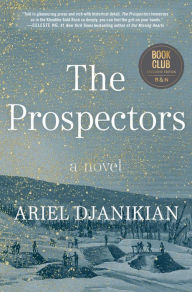Writing Into the Intimate Moments: 5 Questions with Ariel Djanikian, Author of The Prospectors, Our October Book Club Pick
The Prospectors (Barnes & Noble Book Club Edition)
The Prospectors (Barnes & Noble Book Club Edition)
In Stock Online
Hardcover $30.00
Trek to the Klondike when you pick up The Prospectors, an expansive story of one family’s fight for gold — and their legacy. From the icy Canadian wilderness to California at the start of the 20th Century, this novel questions one family’s ambition, greed and loyalties as the effects of the Yukon Gold Rush ripple across generations. Pick up our exclusive edition for a unique jacket and endpapers, an author essay about how her own family inspired the book and a helpful reading group guide. Ariel Djanikian answers our questions about what she hoped to accomplish when writing The Prospectors.
Trek to the Klondike when you pick up The Prospectors, an expansive story of one family’s fight for gold — and their legacy. From the icy Canadian wilderness to California at the start of the 20th Century, this novel questions one family’s ambition, greed and loyalties as the effects of the Yukon Gold Rush ripple across generations. Pick up our exclusive edition for a unique jacket and endpapers, an author essay about how her own family inspired the book and a helpful reading group guide. Ariel Djanikian answers our questions about what she hoped to accomplish when writing The Prospectors.
The Prospectors is based on your family history. What about it inspired you to write this book? Whose stories did you want to tell?
My great-great grandmother left behind a memoir of her trek north during the Klondike Gold Rush. I became endlessly fascinated by her account of the family’s travels, and the twist of fate that came with striking it rich. Hers was of course a woman’s perspective — so already different from most nineteenth century histories. But even then, a lot was left out. When I began The Prospectors, it was a chance to write into the intimate moments that I could feel glowing between the words. There were also two willful omissions in the family archive that took important roles in this novel. First of all, the mysterious illness that nearly killed the eldest Bush sister and left her unable to have children. And second, the harms inflicted by the prospectors on the Tlingit and Hän people who lived in the Yukon first.
You’re dealing with big questions here: the impact of the Yukon Gold Rush on First Nations peoples, the moral cost of inheritance, and lost stories of everyday people. How much historical research did you need to do?
My goal was to have the sights and sounds and social world of 1898 at my fingertips. I traveled to Selma, California, and to Dawson City, Yukon, and visited the claims. I panned for gold, studied old maps, and worked in the archives at the Dawson City Museum and the Dänojà Zho Cultural Center. The research was immense, and also tantalizingly incomplete. When you’re dealing in human experience, the facts are never fully available.
North American history often centers rags-to-riches, bootstrap narratives, and the Gold Rush is one of the best examples of this kind of story. Who does this kind of narrative serve? Whose stories remain untold?
The rags-to-riches story is too often that of a solitary and seemingly exceptional person. In The Prospectors, the discoverer of gold, Clarence Berry, is brave and industrious, but he’s also lucky and surrounded by highly competent women. Meanwhile, Alice (his sister-in-law) and Jane (his hired cook) are strivers in their own right, though forced to work within the boundaries drawn for them by their sex. Clarence gets to be the face of wild success, but the truer story is one of a jumble of people who willingly and unwillingly contribute to his mounting wealth.
Did anything surprise you while you were writing this book?
I was surprised by how connected I felt to the witticisms and letters and first-person accounts from 1898. Nothing in the writing — the passion, the greed, the ire — felt truly distant or old-fashioned.
What are you hoping readers will take away from The Prospectors?
I hope readers feel as if they’ve walked a snowy Yukon trail in the all-consuming desire to better their lives. I hope they’ll know the warmth of a faraway cabin, and the sound of water sloshing around in a pan, and the sight of flashing gold in wet gravel. I hope they’ll feel the movement of a century, and continue forward with a fuller past at their backs.
